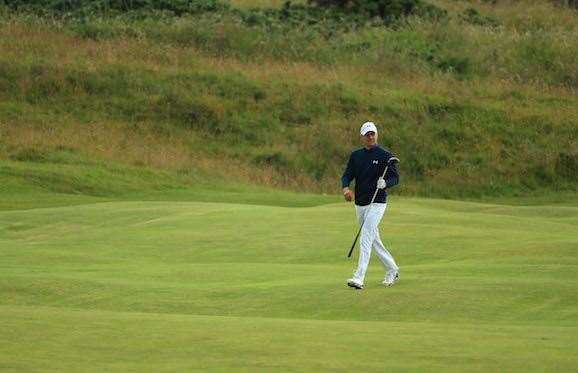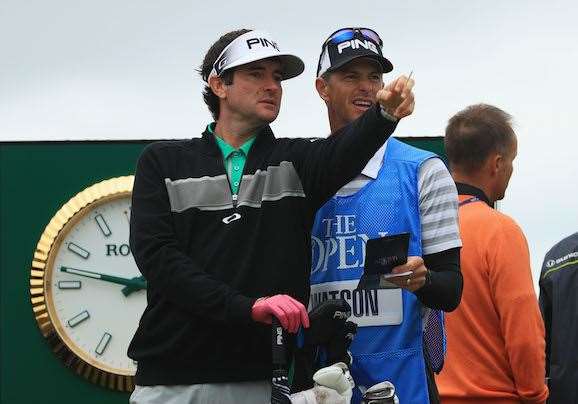Jordan Spieth's Olympic withdrawal has left the men's event without any of the top-four players in the world, putting golf's future at the Games in jeopardy. Brendan James reports
BY BRENDAN JAMES at ROYAL TROON
THREE men sat before assembled members of the world’s golfing media at Royal Troon yesterday as if they were preparing to deliver a joint eulogy.
Appropriately dressed in funeral-best suits, the executive of the International Golf Federation (IGF) was sombre in mood as they voiced disappointment at the withdrawal of the many of the best male players from the Rio Olympics next month. After years of lobbying the International Olympic Committee for inclusion in the Games, the IGF now faces the real possibility golf – at least men’s golf – will be ousted from the Olympics post-2020.
 Jordan Spieth walks along the 6th fairway during a practice round for The Open Championship yesterday. PHOTO: Mike Ehrmann/Getty Images.
Jordan Spieth walks along the 6th fairway during a practice round for The Open Championship yesterday. PHOTO: Mike Ehrmann/Getty Images.The nail in the men’s Olympic Golf coffin came less than an hour before the July 11 announcement of the men’s and women’s fields when World No.3 Jordan Spieth phoned officials to confirm his withdrawal over concerns of the Zika virus. Frenchman Victor Dubuisson and South Korea’s K.T Kim also withdrew at the 11th hour.
Spieth joins World No.1 Jason Day, No.2 Dustin Johnson and No.4 Rory McIlroy as the highest ranked exclusions not going to Rio. Bubba Watson, the World No.5, is now the top-ranked player in the 60-man field, which boasts just 15 players from the top-50 of the world ranking. In the women’s competition, only one eligible player – South Africa’s Lee Anne Pace – has withdrawn from the competition.
Most have cited worries over the Zika virus and the future health of their families as their reason for withdrawing. World No.15 Matt Kuchar will replace Spieth on the four-man American team, which also Watson, Rickie Fowler and Patrick Reed.
OLYMPIC MEN’S FIELD | OLYMPIC WOMEN’S FIELD
IGF President Peter Dawson – flanked by IGF Vice President Ty Votaw and Executive Director Anthony Scanlan – tried to put a positive spin on proceedings but the body language of all three was enough to suggest that at the end of two-year Games qualifying process they are less than happy.
“We have invested a huge amount of time and effort on player education and they've had no lack of opportunity, I think, to make their own well-informed decisions about what they want to do,” Dawson said.
“It's certainly disappointing that we've had so many withdrawals on the men's side, and wonderful that all of the women have been very supportive.
“I think I should say now that I don't think it's appropriate for us to discuss individual cases, especially as they're generally decisions have been taken on health grounds. Speaking collectively though, there is no doubt that the number of withdrawals hasn't shed golf in the best light. Hasn't shown golf in the best light, and we have to accept that. But we do understand why these individual decisions have been taken.
“Personally, I think there's been something of an overreaction to the Zika situation, but that's for individuals to determine, and there's certainly a great deal of concern about this issue inside the game of golf, no doubt about that.”
Dawson added, that despite the withdrawals of many of the top ranked male players, the competition in Rio would be first class.
“We have certainly faced a number of challenges, as I've said along the road, this is another one,” he said. “But we remain confident that we'll stage two very exciting and compelling golf competitions in Rio.
“We have all of the top women playing, and I think the count is 8 out of the top 15 men are going to be playing. So we're going to have strong fields, and the players are going to have a wonderful experience.”
Scanlan said players who had withdrawn over Zika were concerned they would be more at risk than other athletes because of their long exposure in wetland environment the golf course occupies.
“Some of the players have said and the reasons why they're concerned is that the time that they are out, if you like, in the elements and exposed to those risks,” he said. “However, we have to stress that this is still winter, and wintertime the risks diminish considerably, and the facts have shown that since the change of the season.
“Within the course itself, I think, sure, we do have water and we're surrounded by that, but certainly the risk is diminished. And that risk is there, and that's a decision for each of the players to assess, and some have assessed it as a risk too high.”
Dawson then interjected: “I take great heart though from the fact we haven't lost a greenskeeper yet.”
 Bubba Watson is enthusiastic to represent the US at the Olympics.
Bubba Watson is enthusiastic to represent the US at the Olympics.PHOTO: Mike Ehrmann/Getty Images.
However, the former chief of the R&A did confess that it would take some time for golf’s elite to regard the Olympics as highly as major championships.
“I think it is true that for many players, not all, but for many players a major golf championship today they regard as the pinnacle of the game,” Dawson said.
“I don't actually think that matters. I think there's still room for them to go and play in the Olympic Games. They play most weeks of the year not at major championships, so they're not exclusively playing in majors.
“I just don't think it actually matters at this point whether they regard it as much as a major or not, frankly. It doesn't stop them going to play.
“I do think this is more about the health issues than anything else.”
Golf and rugby as Olympic sports will be reviewed in 2017. Given the promise back in 2009 – when golf was accepted into the Olympic fold – that the best players would be on show, its future as an Olympic sport looks grim.
Spieth is expected to address the media on Tuesday as he continues his final preparations for this week’s Open Championship.
Related Articles

Australia still suits Lydia Hall
.jpg&h=172&w=306&c=1&s=1)
Aussie star hoping to avoid same PGA potholes in 2026













